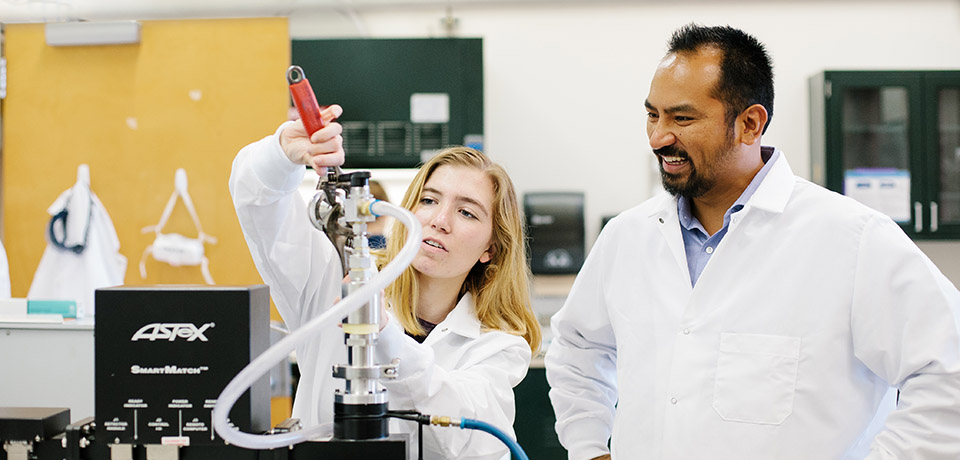Dato Receives NSF CAREER Grant for Groundbreaking Nanocomposite Research
February 6, 2020
The National Science Foundation (NSF) has awarded a Faculty Early Career Development (CAREER) grant to Assistant Professor of Engineering Albert Dato for his research of materials that can provide solutions to energy and environmental challenges.
The $500,000 grant from the NSF Advanced Manufacturing Program funds the project “Understanding the Process-Structure-Property Relationships in Polymer Nanocomposites Reinforced with Gas-Phase-Synthesized Graphene.” Dato’s multidisciplinary research at Harvey Mudd College focuses on the scalable and sustainable manufacturing of nanocomposites containing gas-phase-synthesized graphene (GSG).
Graphene is a single layer of carbon atoms densely packed in a honeycomb lattice that possesses extremely high mechanical and thermal properties. GSG is a unique form of graphene that is produced in atmospheric plasmas. The objective of Dato’s project is to test the hypothesis that high-strength multifunctional nanocomposites can be created by reinforcing polymers with GSG. Recently published research by Dato and his students Kevin Nakahara ’20, Jacob Knego ’18, Taylor Sloop ’20, Chance Bisquera ’19 and Nicole Subler ’16 demonstrates that GSG-based nanocomposites exhibit significant enhancements in both strength and strain at break.
“We initially predicted that incorporating GSG into polymers would enhance strength. We were surprised to discover that our nanocomposites have both increased strength and the ability to stretch further than pure polymer specimens,” Dato says. “Normally, those are trade-off properties in polymers containing graphene. An increase in strength comes at the expense of strain at break. But we were able to have our cake and eat it, too.”
“The NSF supports basic research to create knowledge that transforms the future,” says Dato. “The students’ discovery was groundbreaking because the results cannot be explained by the current knowledge of graphene-based nanocomposites. The property enhancements in our specimens are also much higher than what has been reported in literature. This CAREER project will reveal new strengthening and thermal transport mechanisms in nanocomposites that will transform knowledge of graphene and advance fundamental understanding of composite materials.”
The many potential applications for graphene-based nanocomposites include safer vehicles with increased fuel efficiency, impact-resistant electronics with improved heat dissipation, and lightweight wind turbine blades capable of generating larger amounts of renewable energy. “The manufacturing of these applications requires graphene that is highly ordered, effectively disperses in polymers, resists aggregation and is environmentally friendly to produce,” Dato says. “GSG meets these requirements.”
The CAREER award will also enable Dato to create and disseminate a new nanocomposites course, as well as involve high school students in scientific research and near-peer mentoring via HMC’s Upward Bound program.
“Harvey Mudd College is a unique place,” Dato says. “I’m just happy that my proposal to the NSF was able to articulate the amazing research that the faculty and students are doing here. Every day I get inspired by my colleagues. Our goal, at the end of the day, is to have a positive impact on society.”
The Faculty Early Career Development (CAREER) Program is a foundation-wide activity that offers the NSF’s most prestigious awards in support of early career faculty who have the potential to serve as academic role models in research and education and to lead advances in the mission of their department or organization. Past HMC faculty recipients include computer science professor Yi-Chieh (Jessica) Wu (2018), computer science professor Jim Boerkoel (2017), chemistry professor Lelia Hawkins (2015) and engineering professor Nancy Lape (2009).
NSF grants are the largest share of external support for faculty research at Harvey Mudd.
